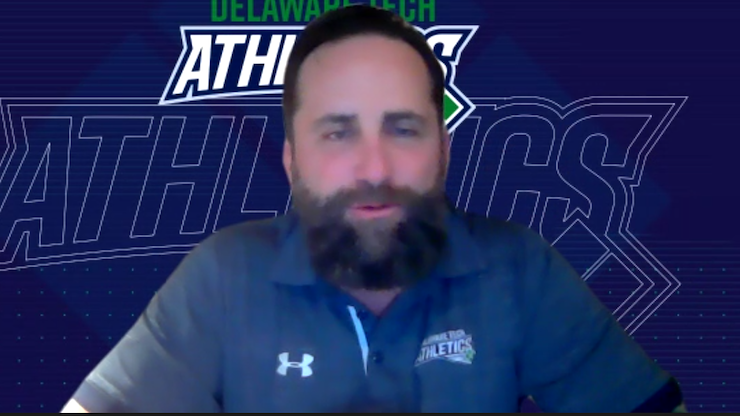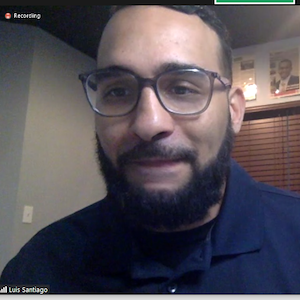
Michael Ryan, Collegewide Director of Athletics at Delaware Technical Community College , talks to EPAC student-athletes about the importance of mentoring and networking during the latest session of the online Leadership Series.
As they patiently wait to get back on the playing field, student-athletes from across the Eastern Pennsylvania Athletic Conference (EPAC) took a time-out together to learn the value of mentorship and networking in the workplace.
The EPAC, which includes the 12 community colleges in Eastern Pennsylvania and Delaware, hosted the fourth installment of its virtual Leadership Series, which began as a healthy way for athletes to engage and stay connected with one another while the pandemic continues to sideline competition. The series, which launched in September, is under the leadership of Montgomery County Community College Assistant Athletic Director Nyere Miller and is based on a program the College began last year that Miller spearheaded.
“It’s not always about what you know, but it’s all about who you know,” said Michael Ryan, Collegewide Director of Athletics at Delaware Technical Community College (DTCC). “That’s a big part of the message you’ll receive tonight.”
Ryan, along with Luis Santiago, Vice President at Bank of America’s Corporate Audit Department, and Kia Baker, Career Counselor at DTCC, led the hour-long online discussion.
Ryan’s message to students was focused on the importance of finding a person who can help them start their careers and then working hard to earn the opportunity they’re given.
“Once those people help you and open the doors for you, it’s all up to you,” he said. “Get your foot in the door, then you have to prove you are a valuable asset to that team. Once you’re there, you have to bring your A game.”
Ryan said he landed his first job thanks to his former high school football coach, Don Keister, who offered him a position on his staff at Thomas McKean High School. From there Ryan rose up the ranks to become a guidance counselor at the school for 15 years, and during that time served as the head football coach for 13 years and coached the golf, basketball and track teams during various seasons. He then landed a job at Delaware Military Academy, where he was athletic director, dean of discipline, and head football coach for five years. He’s now in his second year at DTCC.
 Santiago, a former student-athlete who played for Ryan in high school, discussed the
difference between a mentor and a sponsor.
Santiago, a former student-athlete who played for Ryan in high school, discussed the
difference between a mentor and a sponsor.
“A mentor is a trusted counselor who expects very little in return,” he said. “A sponsor is someone who vouches or is responsible for a person. They expect a great deal. Performance is loyalty. This person encourages you to take risks and has your back.”
A good mentor or sponsor will challenge you to be better, he said.
“They’ll give you the tools to get the answer, not give you the answer,” he said.
Santiago said it was important that once you’ve found a mentor that you maintain the relationship by reaching out to that person at least four times a year.
 Lastly, Baker finished the discussion by talking to students about the importance
of networking. In addition to creating connections, networking fosters relationship
and cultivates common ground and promotes learning.
Lastly, Baker finished the discussion by talking to students about the importance
of networking. In addition to creating connections, networking fosters relationship
and cultivates common ground and promotes learning.
“Learning is continuous. It never stops,” she said. “There’s an opportunity to find more information and knowledge.”
Baker challenged students to come up with a 60-second elevator pitch or a concise message about themselves that addresses who they are, their strengths, accomplishments and the value they bring to an organization that they can use in networking situations.
She encouraged students to create a LinkedIn profile for themselves and reach out to folks they’ve networked with to stay connected.
“Following up is essential to building and maintaining your network,” she said.
The EPAC Leadership series will continue with the following two events:
March 4, 2021: EPAC alumni panel
- Invite former EPAC student-athletes back to discuss their personal journeys.
- How was the transition from junior college to a four-year institution?
- How did junior college prepare you academically and athletically?
- What advice do you have for current EPAC student-athletes?
April 1, 2021: Making the transition to a four-year institution/workforce
- How do I market myself?
- How do my student-athlete skills transition into real life experience?
